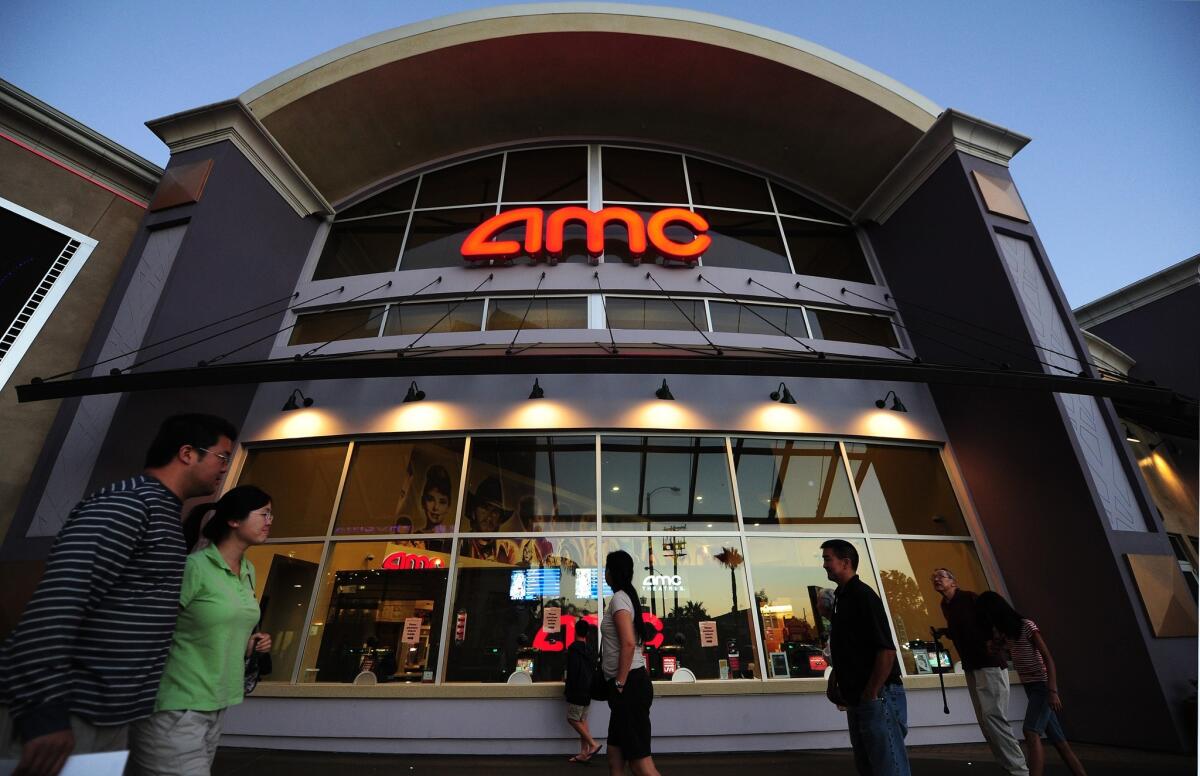AMC Theatres warns of up to $2.4 billion loss, flags ‘going concern’ doubts

AMC Theatres, the world’s largest operator of cinemas, warned of losses that could reach up to $2.4 billion in the first quarter and flagged that it might not be able to continue as a “going concern.”
The Leawood, Kan.-based exhibitor, which has been expanding in the Los Angeles area in recent years, revealed the potential losses in preliminary results for its first quarter.
AMC, owned by China’s Dalian Wanda Group, also said it was restructuring its $5.3-billion debt load and that it would seek relief under the government CARES Act bailout fund as its theaters remained shut through June.
But due to the uncertainty over the potential for reopening, the cinema chain said “substantial doubt exists about our ability to continue as a going concern for a reasonable period of time.” Some theater owners had hoped to open as soon as mid-June or July.
“During this period, we are generating effectively no revenue,” the company said in a regulatory filing. “Even if governmental operating restrictions are lifted in certain jurisdictions, distributors may delay the release of new films until such time that operating restrictions are eased more broadly domestically and internationally, which may further limit our operations.”
The warnings give insight into the financial woes the pandemic has caused the entertainment industry. Although AMC and other big chains have expanded rapidly in recent years through acquisitions, the health crisis has cast doubt on the theater industry’s ability to continue operating as it did before. Movie studios have shifted film releases online during the shutdown, and it’s unclear how long they will allow films to be exclusive to theaters once they reopen and how many of their consumers will return.
“It shows the risk that is still out there,” said Eric Wold, analyst at B. Riley FBR. “They are probably the exhibitor that has the most risk and uncertainty at this time.”
The psychological thriller ‘Unhinged’ arrives in theaters July 1. The movie will be Hollywood’s first test of audiences’ willingness to show up.
AMC said it expected its total revenues for the three months ending March 31 to fall to $941.5 million, down 22% from the same period last year. A net loss for the first quarter will fall somewhere between $2.12 billion and $2.42 billion, up from $130 million last year. Earnings after taxes and other charges are expected to fall to $3.1 million, down 97% from a year ago when results are released June 9.
In April, AMC issued $500 million in new debt to help it get through the crisis, which forced the closing of all of its 1,000 locations around the world, including 630 in the U.S. Theaters have been closed since mid-March due to government restrictions intended to curb the virus spread. That financing gave it enough liquidity to withstand a shutdown until a partial reopening by Thanksgiving, the company previously said.
Amid the COVID-19 pandemic, federal guidelines will leave decisions about reopening businesses to the states. Cinema owners are hopeful they will be able to ramp up for at least part of the summer.
On Wednesday AMC laid out the details of a restructuring of its $5.3-billion borrowings. The new notes represent just over 50% of the face value of the outstanding bonds and will pay higher interest.
It would reduce its total debt by up to 11% to $4.69 billion, the company said in a regulatory filing.
“It’s actually a really brilliant plan, and the open question is: Do the existing bondholders take it,” said Michael Pachter, research analyst at Wedbush Securities.
AMC, however, added that if operations didn’t restart within its estimated timeline, or if another coronavirus outbreak were to cause a new shutdown, it might need more financing to stay afloat.
A few states have already given the go-ahead to theaters to reopen, and some studios are planning for major movie releases as soon as July.
Some analysts question, however, whether theaters can effectively sanitize their locations or test asymptomatic customers. There’s also uncertainty over what will happen if an outbreak is traced back to a screening.
“The theater chains are being unrealistically Pollyannaish about this,” Pachter said.
Some analysts have predicted that the if the outbreak is extended and prolongs a cash crunch, it could force heavily indebted AMC to file for Chapter 11 bankruptcy protection from creditors. AMC has already laid off or furloughed thousands of workers, including 600 corporate staffers, including Chief Executive Adam Aron.
Its rivals also are struggling. Cinemark released first-quarter earnings Wednesday that showed the heavy financial toll of the virus. The company posted a net loss of $59.6 million for the period ending March 31.
More to Read
Inside the business of entertainment
The Wide Shot brings you news, analysis and insights on everything from streaming wars to production — and what it all means for the future.
You may occasionally receive promotional content from the Los Angeles Times.












